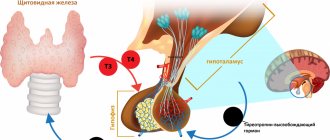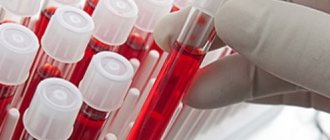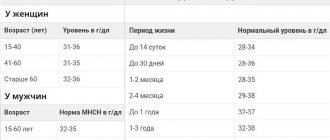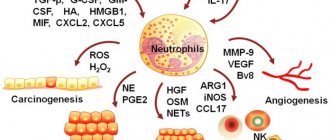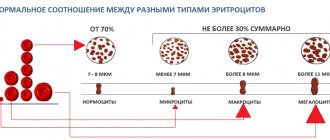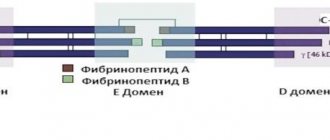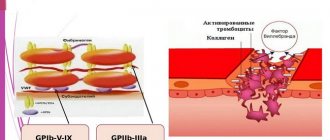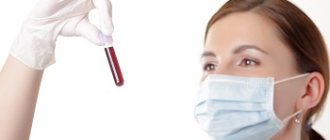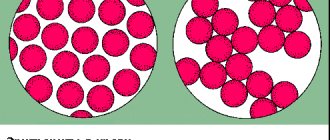Author
Azizov Parviz Faragat Ogly
Leading doctor
Allergist
until November 30
We are giving away 1000 rubles for all services for a visit in November More details All promotions
Immunological blood test
is a laboratory research method that allows you to assess the state of general immunity, its intensity - that is, how much the body’s defense system is involved at the time of analysis, determine the number and function of immune blood cells, and the presence of antibodies in it. Immunological analysis can identify primary and secondary immunodeficiencies and help in the diagnosis of autoimmune, hematological, infectious and lymphoproliferative diseases.
When is an immunological blood test prescribed?
Immunological research is carried out:
Immunological blood test
- in case of recurring infectious diseases;
- if the infectious disease is severe and protracted;
- if you suspect congenital or acquired immunodeficiency;
- if an autoimmune disease is suspected;
- for allergic reactions;
- before major surgical interventions;
- if the postoperative period occurs with complications;
- in order to monitor the progress of treatment with certain groups of medications (immunosuppressants, immunomodulators, etc.).
Indications
It is recommended to take an immunogram for your child if the following indications exist:
- frequent ailments, general causeless weakness, dizziness, nausea;
- situational or seasonal ailments (suspicion of bronchial asthma and allergies);
- frequent acute respiratory viral infections, prolonged infections that recur twice every three months or more often;
- constant exacerbations of chronic diseases;
- a history of autoimmune diseases (lupus, vasculitis, angioedema, myasthenia gravis and a number of others);
- constant relapses of herpes infection;
- suspected HIV;
- long-term therapy with antibacterial drugs, which does not produce results;
- long-term non-healing ulcers and wounds on the body.
An immunogram is prescribed strictly according to indications, by an immunologist-allergist. It makes sense to take a test before vaccination only if the child has a confirmed acquired or congenital immunodeficiency. In this situation, an immunogram will show whether the body can adequately respond to the introduction of the vaccine or whether the child needs a medical withdrawal.
Immunological blood test at the "Family Doctor"
For the study, blood is taken from the ulnar vein. You can donate blood for an immunological test at any of the Family Doctor clinics.
The results are interpreted by an immunologist, who takes into account examination data, patient complaints and the results of other studies. The greatest attention is paid to significant deviations from the norm (more than 20%), smaller deviations can be caused by random factors - diet, stress, physical activity, as well as individual characteristics of the body.
Determination of the degree of immune disorders
There are a large number of approaches to assess the patient's condition. Some of them offer calculation of the number of diseases taking into account their severity per year, others are purely calculation methods. Using an immunogram, you can also determine the severity of disorders of the humoral and cellular components or evaluate the effectiveness of treatment over a certain amount of time.
To do this you need to use the following formula:
((Pathological indicator of the patient / Norm of this indicator) – 1) * 100%
The number of B cells, Cytotoxic cells or T helper cells is most often used as the parameter being studied. If the result obtained is negative, the severity of the disorders and the need for active drug therapy can be determined:
| Calculation result | Interpretation | Need for pharmacotherapy |
| Less than 34% | Minor violations | Absent, with the exception of those conditions in which a person is bothered by frequent and severe infectious diseases |
| 34-66% | Moderate violations | Necessary |
| More than 66% | Severe immunodeficiency |
Immunological blood test indicators
Immunological analysis includes a set of indicators that reflect the composition and functional activity of the main cells of the immune defense, broken down by cell type and the products of their activity (immunoglobulins). A comprehensive analysis of the immune system is quite complex and time-consuming, so depending on the purpose of the study, the immunological analysis may be limited to indicators representing a specific immune function or affected by a specific pathology.
Most often studied:
- subpopulations of lymphocytes
- white blood cells, various types of which recognize foreign structures (antigens), produce antibodies directed against foreign agents, regulate the intensity of immune processes, recognize and destroy altered body cells (for example, cancer cells); - Immunoglobulins
are antibodies whose function is to neutralize infectious pathogens and toxins.
First of all, immunoglobulins of classes A, M, G are studied. Immunoglobulins A (IgA)
provide local immunity of the mucous membranes. Increased levels of IgA are observed in diseases of the skin, digestive and respiratory organs. This is also typical for intoxication, alcoholism, liver and kidney pathologies. - Immunoglobulins M (IgM)
are actively produced during the body’s primary defense reaction, so their increased amounts are observed at the onset of any disease. An increased IgM value is also observed in liver diseases (primarily hepatitis or cirrhosis of the liver). - Immunoglobulin G (IgG)
is the most widespread class of immunoglobulins. They are the main defense produced in response to infection entering the body. Their task is to kill fungi, viruses, pathogenic bacteria, and neutralize toxins produced by the infectious agent. They are responsible for long-term immunity, protecting us from repeated infection. - Immunoglobulins E and D
are produced mainly in response to a parasitic infection (worm infestation) or in the case of atopic allergies.
To determine the body's sensitivity to certain allergens, a special study is carried out - an allergy panel, which identifies specific antibodies to a specific group of allergens (usually immunoglobulins of classes E or G).
Level 1 tests
- determination of the relative and absolute number of leukocytes, neutrophils, monocytes, lymphocytes and platelets in peripheral blood;
- determination of functional activity of neutrophils (NST test);
- immunophenotyping tests to determine the relative and absolute number of T- and B-lymphocytes, natural killer cells;
- determination of the concentration of immunoglobulins of the main classes (IgA, IgM, IgG, IgE);
- determination of hemolytic activity of complement.
Using a minimal set of tests, you can diagnose primary immunodeficiencies: chronic granulomatous disease, X-linked agamma globulinemia, hyper-IgM syndrome, selective IgA deficiency, Wiskott-Aldrich syndrome, severe combined immunodeficiency.
Preparing for an immunological blood test
In order for the test results to be accurate, blood should be donated on an empty stomach. It's best to do this in the morning. Optimally, the patient should not eat or drink anything other than water for 12 hours before the test.
You should not drink alcohol on the eve of the test. It is advisable not to smoke for an hour before the test.
Immediately before taking the test, it is advisable to sit down and be at rest for 10-15 minutes to eliminate the influence of physical and emotional stress on the research results.
Sign up for diagnostics Do not self-medicate. Contact our specialists who will correctly diagnose and prescribe treatment.
Norm
Deciphering an immunogram is much more difficult than analyzing a regular blood test. This study includes a large number of indicators that not only need to be compared with existing standards, but also analyzed in their entirety. However, first of all, it is necessary to know the normal values.
They may differ slightly in different laboratories. This is due to the use of various tools, diagnostic methods and reagents. As a rule, immunogram norms are given on the sheet with the examination results. If they are absent, we suggest using the following immunogram table:
| Immunogram indicator | Norm |
Cellular (“fast”) | |
| Cytotoxic T cells (CD3+, CD8+) | 0.3-0.9*109/l 23-36, % |
| T helper cells (CD4+) | 0.45-0.86*109/l 23-49, % |
| T-suppressors (CD8+) | 0.26-0.53*109/l 17-26, % |
| T cells with receptor for IL-2 (CD25+) | 0.01-0.08*109/l 0,1-0,7, % |
| Carriers of apoptosis marker (CD95+) | 0.11-0.3*109/l 1,6-7,2, % |
Humoral (“slow”) | |
| B cells (CD20+) | 0.12-0.33*109/l 6-20, % |
| Immunoglobulin G | 7.5-15.46, g/l |
| Immunoglobulin M | 0.65-1.65, g/l |
| Immunoglobulin A | 1.25-2.52, g/l |
| Immunoglobulin D | 0-0.07, g/l |
Non-specific indicators (reflect the work of both units) | |
| Natural/natural killer (CD16+) or NK cells | 0.16-0.36*109/l 8,1-18,0, % |
| Cells with HLA marker | Lymphocytes: 0.17*109/l Monocytes: 0.18*109/l |
| Phagocytic indicator | 60-90, % |
| Phagocytic number | 6-9, units |
| Leukocyte migration inhibition reaction (abbreviated as RTML) | With specific antigen: 82-121% With phytohemagglutinin (with PHA): 21-80% With concavalin A (with ConA): 40-76% |
| NST test | Spontaneous: 5-12.% Activated: 10-35,% |
| Complement | 30-50, % |
Click to enlarge
Reasons for false results
In addition to the innate characteristics of immunity, there are a large number of pathologies that lead to changes in analysis parameters. In order not to get confused, you need to understand what the immunogram actually shows. It reflects the number and condition of various groups of leukocytes and phagocytes - blood cells and internal organs responsible for protecting the body.
Traditionally, an immunogram is used to identify hereditary immune disorders. Therefore, before carrying out it, it is necessary to exclude the presence of the most common conditions that can also have a negative impact on a person’s natural defenses. These include:
- Malignant tumors of any organ;
- Autoimmune diseases: rheumatoid arthritis, systemic scleroderma and lupus, various systemic vasculitis (including Behcet's disease, microscopic and giant cell vasculitis, periarteritis nodosa, etc.);
- Viral diseases, including HIV, “blood” hepatitis;
- Severe intoxication: alcohol, drugs, industrial hazardous substances, poisons, etc.;
- Aplastic anemia is a group of diseases in which the growth and maturation of all blood cells is impaired;
- Consequences of radiation exposure.
It is also necessary to remember that the cause of a false increase or decrease in parameters may be improper preparation for blood donation. Only after excluding all of the above conditions can we talk about the presence of primary immunodeficiency. A medical genetic study can be used as a confirmatory test.
"Myths" about immunity
Fresh fruits and vegetables will improve weakened immunity
Undoubtedly, these products are useful for many diseases. In particular, they are a source of plant fiber, which stimulates normal digestion. With atrophy of the gastric mucosa, they improve the secretion of digestive juices and help in processing food. However, the amount of vitamins obtained from fruits and vegetables is extremely small and cannot help treat immune disorders;
Identified immunodeficiency in a child does not need to be treated; it will go away on its own after puberty.
This opinion is very common not only among the population, but also among a certain group of doctors. Such a judgment is very dangerous - the question of the need for treatment in each individual case is decided by an immunologist. And if the risk of frequent and severe infections exceeds the risk of side effects from medications (which are quite rare), therapy is necessary for the child;
Immunomodulators are absolutely useless in the treatment of immunodeficiencies
Several years ago, a large study was conducted that confirmed that the use of immunomodulators reduces the duration of treatment for ARVI by only 1 day or less. That is, they have a completely insignificant effect. This argument is often used by some doctors and patients, justifying their refusal to use them for primary immunodeficiencies. Does anything in this argument bother you?
- First, the aim of the study was to evaluate the effect on duration of treatment, but not on the prevention of infectious diseases.
- Secondly, it was carried out on healthy people who did not suffer from immunodeficiencies. If you study foreign literature and the results of suitable research works, you can find the following information. Immunomodulators have relatively little effectiveness, but they prevent the development of severe and frequent infections in people with primary immunodeficiencies, and also reduce the likelihood of death.
At the moment, there are other, more effective medicines abroad to maintain the body’s defense systems. Their price alone is many times higher, and availability in Russia is extremely limited. Therefore, immunomodulators, lysates of microorganisms, interferon preparations are one of the options for treating these diseases in the Russian Federation.
References
- Encyclopedia of clinical laboratory tests / ed. WELL. Titsa. - M.: Labinform, 1997. - P. 213-215, 223-226.
- JVaillant, A., Jamal, Z., Ramphul, K. Immunoglobulin. In: StatPearls, 2021.
- Sathe, A., Cusick, J. Biochemistry, Immunoglobulin M. StatPearls Publishing, 2021.
- Histology (introduction to pathology) / ed. E.G. Ulumbekova, Yu.A. Chelysheva. - M.: GEOTAR-Media, 1997. - P. 528 – 530.
- Kumar, V., Abbas, A., Fausto, N. et al. Robbins and Cotran Pathologic Basis of Disease, 2014. - 1464 p.
